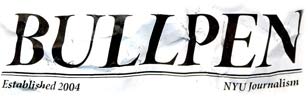Lecture: Bill Kovach

Bill Kovach answers questions from NYU journalism students after his Brown Bag lecture. Photo: Kristina Fiore.
White-haired, with the air of a Southern gentleman, Bill Kovach spoke in a soft drawl, still redolent of the East Tennessee country where he grew up. Yet there was urgency in his voice when he insisted that journalists need to make sense of their changing role as the public relies increasingly on online sources of news and information, many of them unverified, such as blogs and public-relations websites.
The Internet has made it easier for bloggers and government agencies to spin the facts or disseminate misinformation, unfiltered by the press, Kovach told an audience of students and faculty during his November 15 "Brown Bag" lecture in New York University's Department of Journalism.
"We're in a new world where the public has access to more information, enabling them to become editors and publishers," said Kovach. "Our role [is to help] them sort out the information. We give them the set of tools they need to do that."
Kovach is the president of the Committee for Concerned Journalists, a Washington, D.C.-based consortium, founded in 1997, that seeks, in the words of a statement on the website Journalism.org, "to clarify standards and principles in journalism by bringing journalists together to discuss their craft, its purpose, and what sets it apart from other forms of communication." A well-known media observer and press critic, he was editor of The Atlanta Journal-Constitution (which won two Pulitzer Prizes under his leadership), headed the journalism-educational organization The Nieman Foundation, and worked as a reporter and, ultimately, Washington bureau chief for The New York Times.
Ostensibly, Kovach had come to NYU to share his wisdom about the social role of journalism with students and faculty. In reality, he confided, he was on assignment as a reporter. He wanted to ask the "next generation of journalists" how they intend to handle competition from online sources, many of whom leak information without discretion or, in some cases, verification, in his opinion.
Kovach warned his audience to be especially wary of information on government websites. He offered an example: at an October 31, 2005 press briefing, said Kovach, the NBC News correspondent David Gregory asked the White House press secretary Scott McClellan if the vice presidential aide Lewis "Scooter" Libby and the senior Bush advisor Karl Rove had spoken with reporters about covert CIA official Valerie Plame. McClellan's reply was, "That's accurate." According to Kovach, the transcript appearing on the White House website gives McClellan's response as "I'm not sure if that's accurate."
"We're in a new world where the public has access to more information, enabling them to become editors and publishers," said Kovach. "Our role becomes a way of helping them sort out the information. We give them the set of tools they need to do that."
Ordinary citizens would have no reason to doubt the accuracy of the transcript, said Kovach, so why would they believe media accounts of the press conference that contradict the White House version?
He laments this state of affairs, because "disbelief [in the press] develops a cynicism that erodes democracy."
But how are journalists supposed to challenge the sources they rely on when they've been taught that their reporting should be unbiased, asked Jennifer Rockett, a broadcast journalism major.
"You have to talk to the community, know how they think," said Kovach. "The more you're seen in your community as someone who cares about the community, the better," Kovach said. "I wish I had a better answer for you."
"Bill," called out an audience member dressed in a suit. "You do have a better answer."
Much to Kovach's surprise, it was Tom Rosensteil, Vice President of the Committee for Concerned Journalists, and co-author with Kovach of a book that has become a standard text for journalism students, The Elements of Journalism.
"[Journalists] can't be the gatekeepers of information anymore," said Rosensteil. But "if you're not the gatekeeper, what's your role? The new idea is that you are the authenticator. What, in this crazy world where facts are a commodity, can [your audience] believe?"
Kovach agreed that the role of the journalist in the 21st century will be that of the authenticator. Assuming this new role will help newspapers thrive, he said, despite current predictions they will not.
"More likely, just a few [newspapers] will exist," he said. "Some will be gatekeepers, more will be authenticators. But the essential role [of the journalist] is always going to be there."

